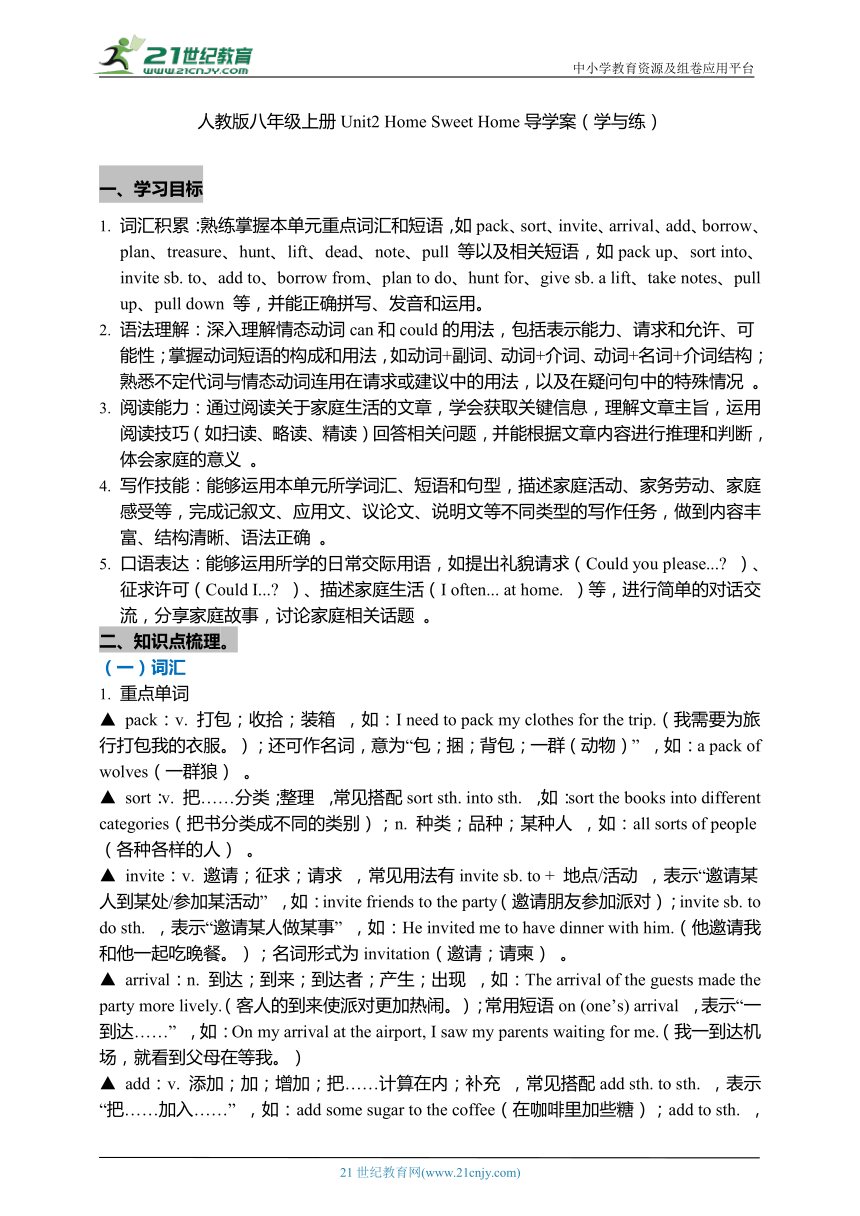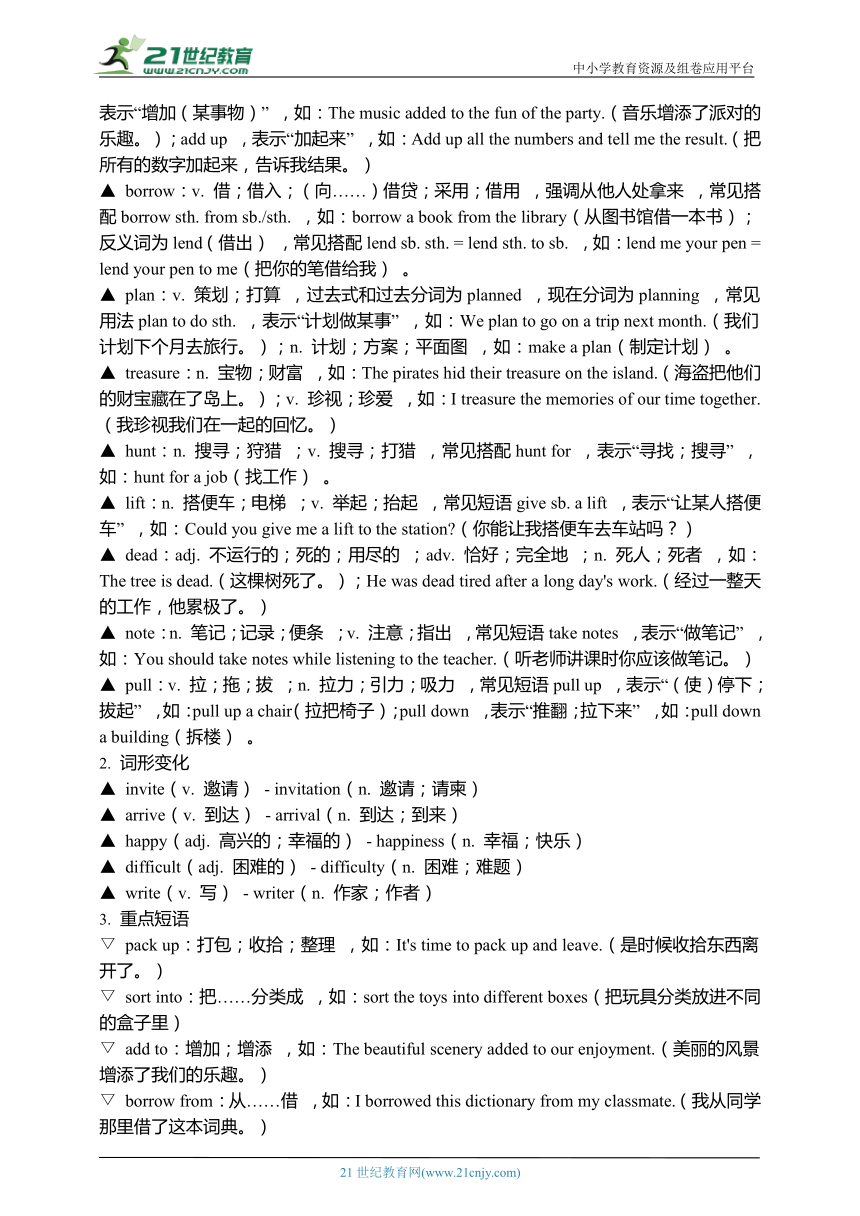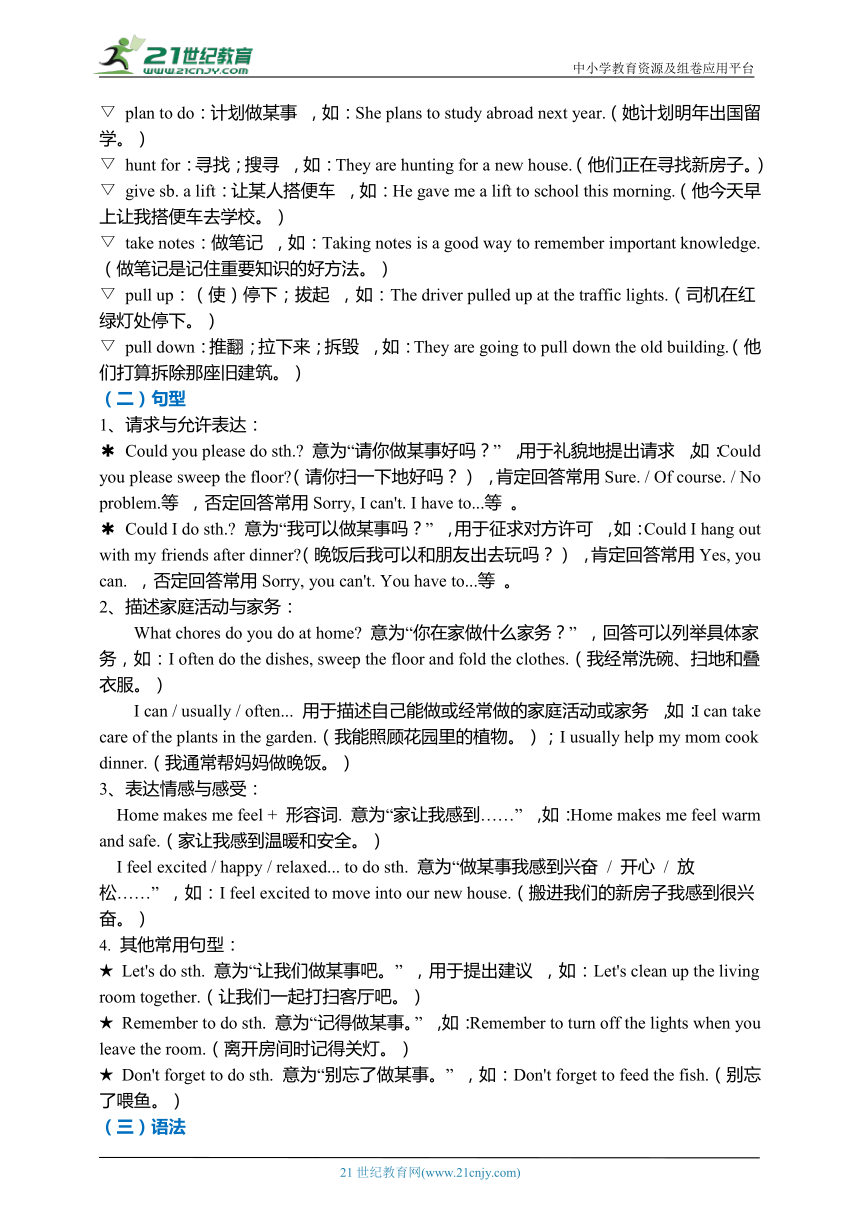Unit2 Home Sweet Home单元导学案(学与练)—人教版八年级上册
文档属性
| 名称 | Unit2 Home Sweet Home单元导学案(学与练)—人教版八年级上册 |

|
|
| 格式 | docx | ||
| 文件大小 | 55.9KB | ||
| 资源类型 | 试卷 | ||
| 版本资源 | 人教版 | ||
| 科目 | 英语 | ||
| 更新时间 | 2025-07-31 00:00:00 | ||
图片预览



文档简介
中小学教育资源及组卷应用平台
人教版八年级上册Unit2 Home Sweet Home导学案(学与练)
一、学习目标
词汇积累:熟练掌握本单元重点词汇和短语,如pack、sort、invite、arrival、add、borrow、plan、treasure、hunt、lift、dead、note、pull 等以及相关短语,如pack up、sort into、invite sb. to、add to、borrow from、plan to do、hunt for、give sb. a lift、take notes、pull up、pull down 等,并能正确拼写、发音和运用。
语法理解:深入理解情态动词can和could的用法,包括表示能力、请求和允许、可能性;掌握动词短语的构成和用法,如动词+副词、动词+介词、动词+名词+介词结构;熟悉不定代词与情态动词连用在请求或建议中的用法,以及在疑问句中的特殊情况 。
阅读能力:通过阅读关于家庭生活的文章,学会获取关键信息,理解文章主旨,运用阅读技巧(如扫读、略读、精读)回答相关问题,并能根据文章内容进行推理和判断,体会家庭的意义 。
写作技能:能够运用本单元所学词汇、短语和句型,描述家庭活动、家务劳动、家庭感受等,完成记叙文、应用文、议论文、说明文等不同类型的写作任务,做到内容丰富、结构清晰、语法正确 。
口语表达:能够运用所学的日常交际用语,如提出礼貌请求(Could you please... )、征求许可(Could I... )、描述家庭生活(I often... at home. )等,进行简单的对话交流,分享家庭故事,讨论家庭相关话题 。
二、知识点梳理。
(一)词汇
重点单词
▲ pack:v. 打包;收拾;装箱 ,如:I need to pack my clothes for the trip.(我需要为旅行打包我的衣服。);还可作名词,意为“包;捆;背包;一群(动物)” ,如:a pack of wolves(一群狼) 。
▲ sort:v. 把……分类;整理 ,常见搭配sort sth. into sth. ,如:sort the books into different categories(把书分类成不同的类别);n. 种类;品种;某种人 ,如:all sorts of people(各种各样的人) 。
▲ invite:v. 邀请;征求;请求 ,常见用法有invite sb. to + 地点/活动 ,表示“邀请某人到某处/参加某活动” ,如:invite friends to the party(邀请朋友参加派对);invite sb. to do sth. ,表示“邀请某人做某事” ,如:He invited me to have dinner with him.(他邀请我和他一起吃晚餐。);名词形式为invitation(邀请;请柬) 。
▲ arrival:n. 到达;到来;到达者;产生;出现 ,如:The arrival of the guests made the party more lively.(客人的到来使派对更加热闹。);常用短语on (one’s) arrival ,表示“一到达……” ,如:On my arrival at the airport, I saw my parents waiting for me.(我一到达机场,就看到父母在等我。)
▲ add:v. 添加;加;增加;把……计算在内;补充 ,常见搭配add sth. to sth. ,表示“把……加入……” ,如:add some sugar to the coffee(在咖啡里加些糖);add to sth. ,表示“增加(某事物)” ,如:The music added to the fun of the party.(音乐增添了派对的乐趣。);add up ,表示“加起来” ,如:Add up all the numbers and tell me the result.(把所有的数字加起来,告诉我结果。)
▲ borrow:v. 借;借入;(向……)借贷;采用;借用 ,强调从他人处拿来 ,常见搭配borrow sth. from sb./sth. ,如:borrow a book from the library(从图书馆借一本书);反义词为lend(借出) ,常见搭配lend sb. sth. = lend sth. to sb. ,如:lend me your pen = lend your pen to me(把你的笔借给我) 。
▲ plan:v. 策划;打算 ,过去式和过去分词为planned ,现在分词为planning ,常见用法plan to do sth. ,表示“计划做某事” ,如:We plan to go on a trip next month.(我们计划下个月去旅行。);n. 计划;方案;平面图 ,如:make a plan(制定计划) 。
▲ treasure:n. 宝物;财富 ,如:The pirates hid their treasure on the island.(海盗把他们的财宝藏在了岛上。);v. 珍视;珍爱 ,如:I treasure the memories of our time together.(我珍视我们在一起的回忆。)
▲ hunt:n. 搜寻;狩猎 ;v. 搜寻;打猎 ,常见搭配hunt for ,表示“寻找;搜寻” ,如:hunt for a job(找工作) 。
▲ lift:n. 搭便车;电梯 ;v. 举起;抬起 ,常见短语give sb. a lift ,表示“让某人搭便车” ,如:Could you give me a lift to the station (你能让我搭便车去车站吗?)
▲ dead:adj. 不运行的;死的;用尽的 ;adv. 恰好;完全地 ;n. 死人;死者 ,如:The tree is dead.(这棵树死了。);He was dead tired after a long day's work.(经过一整天的工作,他累极了。)
▲ note:n. 笔记;记录;便条 ;v. 注意;指出 ,常见短语take notes ,表示“做笔记” ,如:You should take notes while listening to the teacher.(听老师讲课时你应该做笔记。)
▲ pull:v. 拉;拖;拔 ;n. 拉力;引力;吸力 ,常见短语pull up ,表示“(使)停下;拔起” ,如:pull up a chair(拉把椅子);pull down ,表示“推翻;拉下来” ,如:pull down a building(拆楼) 。
词形变化
▲ invite(v. 邀请) - invitation(n. 邀请;请柬)
▲ arrive(v. 到达) - arrival(n. 到达;到来)
▲ happy(adj. 高兴的;幸福的) - happiness(n. 幸福;快乐)
▲ difficult(adj. 困难的) - difficulty(n. 困难;难题)
▲ write(v. 写) - writer(n. 作家;作者)
重点短语
▽ pack up:打包;收拾;整理 ,如:It's time to pack up and leave.(是时候收拾东西离开了。)
▽ sort into:把……分类成 ,如:sort the toys into different boxes(把玩具分类放进不同的盒子里)
▽ add to:增加;增添 ,如:The beautiful scenery added to our enjoyment.(美丽的风景增添了我们的乐趣。)
▽ borrow from:从……借 ,如:I borrowed this dictionary from my classmate.(我从同学那里借了这本词典。)
▽ plan to do:计划做某事 ,如:She plans to study abroad next year.(她计划明年出国留学。)
▽ hunt for:寻找;搜寻 ,如:They are hunting for a new house.(他们正在寻找新房子。)
▽ give sb. a lift:让某人搭便车 ,如:He gave me a lift to school this morning.(他今天早上让我搭便车去学校。)
▽ take notes:做笔记 ,如:Taking notes is a good way to remember important knowledge.(做笔记是记住重要知识的好方法。)
▽ pull up:(使)停下;拔起 ,如:The driver pulled up at the traffic lights.(司机在红绿灯处停下。)
▽ pull down:推翻;拉下来;拆毁 ,如:They are going to pull down the old building.(他们打算拆除那座旧建筑。)
(二)句型
1、请求与允许表达:
Could you please do sth. 意为“请你做某事好吗?” ,用于礼貌地提出请求 ,如:Could you please sweep the floor (请你扫一下地好吗?) ,肯定回答常用Sure. / Of course. / No problem.等 ,否定回答常用Sorry, I can't. I have to...等 。
Could I do sth. 意为“我可以做某事吗?” ,用于征求对方许可 ,如:Could I hang out with my friends after dinner (晚饭后我可以和朋友出去玩吗?) ,肯定回答常用Yes, you can. ,否定回答常用Sorry, you can't. You have to...等 。
2、描述家庭活动与家务:
What chores do you do at home 意为“你在家做什么家务?” ,回答可以列举具体家务,如:I often do the dishes, sweep the floor and fold the clothes.(我经常洗碗、扫地和叠衣服。)
I can / usually / often... 用于描述自己能做或经常做的家庭活动或家务 ,如:I can take care of the plants in the garden.(我能照顾花园里的植物。);I usually help my mom cook dinner.(我通常帮妈妈做晚饭。)
3、表达情感与感受:
Home makes me feel + 形容词. 意为“家让我感到……” ,如:Home makes me feel warm and safe.(家让我感到温暖和安全。)
I feel excited / happy / relaxed... to do sth. 意为“做某事我感到兴奋 / 开心 / 放松……” ,如:I feel excited to move into our new house.(搬进我们的新房子我感到很兴奋。)
其他常用句型:
★ Let's do sth. 意为“让我们做某事吧。” ,用于提出建议 ,如:Let's clean up the living room together.(让我们一起打扫客厅吧。)
★ Remember to do sth. 意为“记得做某事。” ,如:Remember to turn off the lights when you leave the room.(离开房间时记得关灯。)
★ Don't forget to do sth. 意为“别忘了做某事。” ,如:Don't forget to feed the fish.(别忘了喂鱼。)
(三)语法
1、情态动词can和could的用法:
表示能力:can表示现在的能力 ,could表示过去的能力 ,如:I can speak English.(我会说英语。);When I was young, I could ride a bike.(我小时候会骑自行车。)
表示请求和允许:can和could都可用于请求,但could更委婉 。在疑问句中,can用于较为熟悉的人之间或非正式场合 ,could用于更礼貌、更正式的场合 ,如:Can I use your pen (我可以用你的笔吗?);Could you pass me the book (你能把书递给我吗?) 。在回答以can或could开头的请求时,肯定回答用Yes, you can. ,否定回答用No, you can't. ,不用could 。
表示可能性:can常用于否定句和疑问句中表示推测 ,could可用于肯定句、否定句和疑问句中表示推测 ,但could表示的可能性比can小 ,如:It can't be true.(这不可能是真的。);He could be at home.(他可能在家。)
2、动词短语:
动词+副词:这类短语的宾语如果是名词,可放在副词前或后;如果是代词,必须放在副词前 ,如:clean up the room = clean the room up(打扫房间);put it on(穿上它) 。常见短语有clean up(打扫干净)、hang up(挂起;挂断电话)、pack up(收拾;打包)、take out(取出;拿出)、turn on(打开)、turn off(关闭)、put away(放好;收起来)等 。
动词+介词:宾语必须放在介词后面 ,如:look for(寻找)、ask for(请求;要求)、wait for(等待)、listen to(听)、look at(看)等 ,如:I'm looking for my keys.(我在找我的钥匙。)
动词+名词+介词:常见短语有take care of(照顾)、make use of(利用)、pay attention to(注意)等 ,如:We should take care of the old people.(我们应该照顾老人。)
3、不定代词与情态动词连用:
用于请求或建议:Could you do something for me (你能为我做件事吗?);Is there anything I can help with (有什么我可以帮忙的吗?) ,这里用something表示希望得到肯定回答 。
在疑问句中的用法:一般疑问句中,something可表示希望得到肯定回答 ,如:Would you like something to drink (你想喝点什么吗?) ;在否定句和疑问句中常用anything ,如:I don't have anything to eat.(我没有什么可吃的。);Do you have anything interesting to tell me (你有什么有趣的事要告诉我吗?)
(四)课文内容
本单元围绕“家”的主题展开,通过不同的对话和文章,展现了家庭生活的多个方面。
Section A:通过Jim一家搬家前后的对话,呈现了与搬家、布置新家相关的活动和请求许可的场景 。Jim想和朋友出去玩,但爸爸要求他先收拾东西并把物品分类装箱,还让他在箱子上写上“Jim’s bedroom” ;Jim还询问能否在客厅养鱼,爸爸同意后让他帮忙挂照片 。Helen询问能否在阳台种花,妈妈表示赞同 。Peter询问能否邀请朋友来新家,妈妈同意但要求他先帮忙打扫,让他扫地,自己打扫浴室 。这些对话中涉及到了pack up、sort into、hang up、grow flowers、invite等词汇和Could you please... Could I... 等句型的运用 。
Section B:可能包含关于家庭聚会、家庭传统、邻里关系等内容的文章或对话 ,进一步探讨家的意义和价值 。比如描述一家人准备家庭聚会的过程,包括打扫房子、准备食物、装饰房间等活动 ,体现家人之间的合作和对家庭活动的重视 ;或者讲述邻里之间互相帮助、分享的故事,展现家所在社区的温暖和和谐 。通过这些内容,让学生更深入地理解家不仅仅是一个居住的地方,更是充满爱、温暖和亲情的港湾 。
三、随堂练习
(一)词汇运用。
Please help me ________ (pack) my clothes. I'm going on a trip tomorrow.
Can you ________ (sort) these books into different categories
She ________ (invite) me to her birthday party last week.
The ________ (arrival) of the new teacher made the students very excited.
Add some sugar ________ (to / in) the coffee, and it will taste better.
I often ________ (borrow) books from the library.
We are ________ (plan) to visit the Great Wall next month.
The children are ________ (hunt) for Easter eggs in the garden.
Could you give me a ________ (lift / ride) to the airport
Remember to take ________ (note / notes) in class.
(二)单项选择。
—Could I use your computer
—________. I'm using it now.
A. Yes, you can B. No problem C. Sorry, you can't D. Of course
My mother asked me to ________ the rubbish.
A. take off B. take out C. take away D. take up
She is ________ to move into the new house.
A. exciting B. excited C. interest D. interested
Can you help me ________ the photos on the wall
A. put on B. put away C. put up D. put down
—________ I invite my friends to the party
—Yes, you can.
A. Must B. Should C. Need D. Can
The music added ________ the fun of the party.
A. to B. up C. in D. on
We should ________ the old people and take care of them.
A. look for B. look after C. look at D. look up
He often helps his mother ________ the dishes after dinner.
A. do B. does C. doing D. to doing
I want to ________ some money from my father to buy a new bike.
lend B. borrow C. keep D. make
10.The teacher told us that wild animals ______ an important part in the ecosystem.
A. Play B. plays C. played D. will play
参考答案
(一)词汇运用
pack(help sb. do sth. 后接动词原形)
sort(情态动词can后接动词原形)
invited(last week提示一般过去时,invite的过去式为invited)
arrival(定冠词the后接名词)
to(add...to... 是固定搭配,意为“把……加入……”)
borrow(often提示一般现在时,主语是I,用动词原形)
planning(be动词后接现在分词,构成现在进行时)
hunting(be动词后接现在分词,构成现在进行时)
lift(give sb. a lift 是固定短语,意为“让某人搭便车”)
notes(take notes 是固定短语,意为“做笔记”,用复数形式)
(二)单项选择
C(根据“I'm using it now”可知无法同意,否定回答用“Sorry, you can't”)
B(take out the rubbish 意为“倒垃圾”,符合语境)
B(形容人“感到兴奋的”用excited,be excited to do sth. 意为“做某事很兴奋”)
C(put up the photos 意为“挂起照片”,符合语境)
D(根据答语“Yes, you can”可知问句用Can引导,征求许可)
A(add to 是固定短语,意为“增加”)
B(look after 意为“照顾”,符合“照顾老人”的语境)
A(help sb. do sth. 意为“帮助某人做某事”,用动词原形)
B(borrow...from... 意为“从……借……”,符合“向爸爸借钱”的语境)
A
21世纪教育网 www.21cnjy.com 精品试卷·第 2 页 (共 2 页)
21世纪教育网(www.21cnjy.com)
人教版八年级上册Unit2 Home Sweet Home导学案(学与练)
一、学习目标
词汇积累:熟练掌握本单元重点词汇和短语,如pack、sort、invite、arrival、add、borrow、plan、treasure、hunt、lift、dead、note、pull 等以及相关短语,如pack up、sort into、invite sb. to、add to、borrow from、plan to do、hunt for、give sb. a lift、take notes、pull up、pull down 等,并能正确拼写、发音和运用。
语法理解:深入理解情态动词can和could的用法,包括表示能力、请求和允许、可能性;掌握动词短语的构成和用法,如动词+副词、动词+介词、动词+名词+介词结构;熟悉不定代词与情态动词连用在请求或建议中的用法,以及在疑问句中的特殊情况 。
阅读能力:通过阅读关于家庭生活的文章,学会获取关键信息,理解文章主旨,运用阅读技巧(如扫读、略读、精读)回答相关问题,并能根据文章内容进行推理和判断,体会家庭的意义 。
写作技能:能够运用本单元所学词汇、短语和句型,描述家庭活动、家务劳动、家庭感受等,完成记叙文、应用文、议论文、说明文等不同类型的写作任务,做到内容丰富、结构清晰、语法正确 。
口语表达:能够运用所学的日常交际用语,如提出礼貌请求(Could you please... )、征求许可(Could I... )、描述家庭生活(I often... at home. )等,进行简单的对话交流,分享家庭故事,讨论家庭相关话题 。
二、知识点梳理。
(一)词汇
重点单词
▲ pack:v. 打包;收拾;装箱 ,如:I need to pack my clothes for the trip.(我需要为旅行打包我的衣服。);还可作名词,意为“包;捆;背包;一群(动物)” ,如:a pack of wolves(一群狼) 。
▲ sort:v. 把……分类;整理 ,常见搭配sort sth. into sth. ,如:sort the books into different categories(把书分类成不同的类别);n. 种类;品种;某种人 ,如:all sorts of people(各种各样的人) 。
▲ invite:v. 邀请;征求;请求 ,常见用法有invite sb. to + 地点/活动 ,表示“邀请某人到某处/参加某活动” ,如:invite friends to the party(邀请朋友参加派对);invite sb. to do sth. ,表示“邀请某人做某事” ,如:He invited me to have dinner with him.(他邀请我和他一起吃晚餐。);名词形式为invitation(邀请;请柬) 。
▲ arrival:n. 到达;到来;到达者;产生;出现 ,如:The arrival of the guests made the party more lively.(客人的到来使派对更加热闹。);常用短语on (one’s) arrival ,表示“一到达……” ,如:On my arrival at the airport, I saw my parents waiting for me.(我一到达机场,就看到父母在等我。)
▲ add:v. 添加;加;增加;把……计算在内;补充 ,常见搭配add sth. to sth. ,表示“把……加入……” ,如:add some sugar to the coffee(在咖啡里加些糖);add to sth. ,表示“增加(某事物)” ,如:The music added to the fun of the party.(音乐增添了派对的乐趣。);add up ,表示“加起来” ,如:Add up all the numbers and tell me the result.(把所有的数字加起来,告诉我结果。)
▲ borrow:v. 借;借入;(向……)借贷;采用;借用 ,强调从他人处拿来 ,常见搭配borrow sth. from sb./sth. ,如:borrow a book from the library(从图书馆借一本书);反义词为lend(借出) ,常见搭配lend sb. sth. = lend sth. to sb. ,如:lend me your pen = lend your pen to me(把你的笔借给我) 。
▲ plan:v. 策划;打算 ,过去式和过去分词为planned ,现在分词为planning ,常见用法plan to do sth. ,表示“计划做某事” ,如:We plan to go on a trip next month.(我们计划下个月去旅行。);n. 计划;方案;平面图 ,如:make a plan(制定计划) 。
▲ treasure:n. 宝物;财富 ,如:The pirates hid their treasure on the island.(海盗把他们的财宝藏在了岛上。);v. 珍视;珍爱 ,如:I treasure the memories of our time together.(我珍视我们在一起的回忆。)
▲ hunt:n. 搜寻;狩猎 ;v. 搜寻;打猎 ,常见搭配hunt for ,表示“寻找;搜寻” ,如:hunt for a job(找工作) 。
▲ lift:n. 搭便车;电梯 ;v. 举起;抬起 ,常见短语give sb. a lift ,表示“让某人搭便车” ,如:Could you give me a lift to the station (你能让我搭便车去车站吗?)
▲ dead:adj. 不运行的;死的;用尽的 ;adv. 恰好;完全地 ;n. 死人;死者 ,如:The tree is dead.(这棵树死了。);He was dead tired after a long day's work.(经过一整天的工作,他累极了。)
▲ note:n. 笔记;记录;便条 ;v. 注意;指出 ,常见短语take notes ,表示“做笔记” ,如:You should take notes while listening to the teacher.(听老师讲课时你应该做笔记。)
▲ pull:v. 拉;拖;拔 ;n. 拉力;引力;吸力 ,常见短语pull up ,表示“(使)停下;拔起” ,如:pull up a chair(拉把椅子);pull down ,表示“推翻;拉下来” ,如:pull down a building(拆楼) 。
词形变化
▲ invite(v. 邀请) - invitation(n. 邀请;请柬)
▲ arrive(v. 到达) - arrival(n. 到达;到来)
▲ happy(adj. 高兴的;幸福的) - happiness(n. 幸福;快乐)
▲ difficult(adj. 困难的) - difficulty(n. 困难;难题)
▲ write(v. 写) - writer(n. 作家;作者)
重点短语
▽ pack up:打包;收拾;整理 ,如:It's time to pack up and leave.(是时候收拾东西离开了。)
▽ sort into:把……分类成 ,如:sort the toys into different boxes(把玩具分类放进不同的盒子里)
▽ add to:增加;增添 ,如:The beautiful scenery added to our enjoyment.(美丽的风景增添了我们的乐趣。)
▽ borrow from:从……借 ,如:I borrowed this dictionary from my classmate.(我从同学那里借了这本词典。)
▽ plan to do:计划做某事 ,如:She plans to study abroad next year.(她计划明年出国留学。)
▽ hunt for:寻找;搜寻 ,如:They are hunting for a new house.(他们正在寻找新房子。)
▽ give sb. a lift:让某人搭便车 ,如:He gave me a lift to school this morning.(他今天早上让我搭便车去学校。)
▽ take notes:做笔记 ,如:Taking notes is a good way to remember important knowledge.(做笔记是记住重要知识的好方法。)
▽ pull up:(使)停下;拔起 ,如:The driver pulled up at the traffic lights.(司机在红绿灯处停下。)
▽ pull down:推翻;拉下来;拆毁 ,如:They are going to pull down the old building.(他们打算拆除那座旧建筑。)
(二)句型
1、请求与允许表达:
Could you please do sth. 意为“请你做某事好吗?” ,用于礼貌地提出请求 ,如:Could you please sweep the floor (请你扫一下地好吗?) ,肯定回答常用Sure. / Of course. / No problem.等 ,否定回答常用Sorry, I can't. I have to...等 。
Could I do sth. 意为“我可以做某事吗?” ,用于征求对方许可 ,如:Could I hang out with my friends after dinner (晚饭后我可以和朋友出去玩吗?) ,肯定回答常用Yes, you can. ,否定回答常用Sorry, you can't. You have to...等 。
2、描述家庭活动与家务:
What chores do you do at home 意为“你在家做什么家务?” ,回答可以列举具体家务,如:I often do the dishes, sweep the floor and fold the clothes.(我经常洗碗、扫地和叠衣服。)
I can / usually / often... 用于描述自己能做或经常做的家庭活动或家务 ,如:I can take care of the plants in the garden.(我能照顾花园里的植物。);I usually help my mom cook dinner.(我通常帮妈妈做晚饭。)
3、表达情感与感受:
Home makes me feel + 形容词. 意为“家让我感到……” ,如:Home makes me feel warm and safe.(家让我感到温暖和安全。)
I feel excited / happy / relaxed... to do sth. 意为“做某事我感到兴奋 / 开心 / 放松……” ,如:I feel excited to move into our new house.(搬进我们的新房子我感到很兴奋。)
其他常用句型:
★ Let's do sth. 意为“让我们做某事吧。” ,用于提出建议 ,如:Let's clean up the living room together.(让我们一起打扫客厅吧。)
★ Remember to do sth. 意为“记得做某事。” ,如:Remember to turn off the lights when you leave the room.(离开房间时记得关灯。)
★ Don't forget to do sth. 意为“别忘了做某事。” ,如:Don't forget to feed the fish.(别忘了喂鱼。)
(三)语法
1、情态动词can和could的用法:
表示能力:can表示现在的能力 ,could表示过去的能力 ,如:I can speak English.(我会说英语。);When I was young, I could ride a bike.(我小时候会骑自行车。)
表示请求和允许:can和could都可用于请求,但could更委婉 。在疑问句中,can用于较为熟悉的人之间或非正式场合 ,could用于更礼貌、更正式的场合 ,如:Can I use your pen (我可以用你的笔吗?);Could you pass me the book (你能把书递给我吗?) 。在回答以can或could开头的请求时,肯定回答用Yes, you can. ,否定回答用No, you can't. ,不用could 。
表示可能性:can常用于否定句和疑问句中表示推测 ,could可用于肯定句、否定句和疑问句中表示推测 ,但could表示的可能性比can小 ,如:It can't be true.(这不可能是真的。);He could be at home.(他可能在家。)
2、动词短语:
动词+副词:这类短语的宾语如果是名词,可放在副词前或后;如果是代词,必须放在副词前 ,如:clean up the room = clean the room up(打扫房间);put it on(穿上它) 。常见短语有clean up(打扫干净)、hang up(挂起;挂断电话)、pack up(收拾;打包)、take out(取出;拿出)、turn on(打开)、turn off(关闭)、put away(放好;收起来)等 。
动词+介词:宾语必须放在介词后面 ,如:look for(寻找)、ask for(请求;要求)、wait for(等待)、listen to(听)、look at(看)等 ,如:I'm looking for my keys.(我在找我的钥匙。)
动词+名词+介词:常见短语有take care of(照顾)、make use of(利用)、pay attention to(注意)等 ,如:We should take care of the old people.(我们应该照顾老人。)
3、不定代词与情态动词连用:
用于请求或建议:Could you do something for me (你能为我做件事吗?);Is there anything I can help with (有什么我可以帮忙的吗?) ,这里用something表示希望得到肯定回答 。
在疑问句中的用法:一般疑问句中,something可表示希望得到肯定回答 ,如:Would you like something to drink (你想喝点什么吗?) ;在否定句和疑问句中常用anything ,如:I don't have anything to eat.(我没有什么可吃的。);Do you have anything interesting to tell me (你有什么有趣的事要告诉我吗?)
(四)课文内容
本单元围绕“家”的主题展开,通过不同的对话和文章,展现了家庭生活的多个方面。
Section A:通过Jim一家搬家前后的对话,呈现了与搬家、布置新家相关的活动和请求许可的场景 。Jim想和朋友出去玩,但爸爸要求他先收拾东西并把物品分类装箱,还让他在箱子上写上“Jim’s bedroom” ;Jim还询问能否在客厅养鱼,爸爸同意后让他帮忙挂照片 。Helen询问能否在阳台种花,妈妈表示赞同 。Peter询问能否邀请朋友来新家,妈妈同意但要求他先帮忙打扫,让他扫地,自己打扫浴室 。这些对话中涉及到了pack up、sort into、hang up、grow flowers、invite等词汇和Could you please... Could I... 等句型的运用 。
Section B:可能包含关于家庭聚会、家庭传统、邻里关系等内容的文章或对话 ,进一步探讨家的意义和价值 。比如描述一家人准备家庭聚会的过程,包括打扫房子、准备食物、装饰房间等活动 ,体现家人之间的合作和对家庭活动的重视 ;或者讲述邻里之间互相帮助、分享的故事,展现家所在社区的温暖和和谐 。通过这些内容,让学生更深入地理解家不仅仅是一个居住的地方,更是充满爱、温暖和亲情的港湾 。
三、随堂练习
(一)词汇运用。
Please help me ________ (pack) my clothes. I'm going on a trip tomorrow.
Can you ________ (sort) these books into different categories
She ________ (invite) me to her birthday party last week.
The ________ (arrival) of the new teacher made the students very excited.
Add some sugar ________ (to / in) the coffee, and it will taste better.
I often ________ (borrow) books from the library.
We are ________ (plan) to visit the Great Wall next month.
The children are ________ (hunt) for Easter eggs in the garden.
Could you give me a ________ (lift / ride) to the airport
Remember to take ________ (note / notes) in class.
(二)单项选择。
—Could I use your computer
—________. I'm using it now.
A. Yes, you can B. No problem C. Sorry, you can't D. Of course
My mother asked me to ________ the rubbish.
A. take off B. take out C. take away D. take up
She is ________ to move into the new house.
A. exciting B. excited C. interest D. interested
Can you help me ________ the photos on the wall
A. put on B. put away C. put up D. put down
—________ I invite my friends to the party
—Yes, you can.
A. Must B. Should C. Need D. Can
The music added ________ the fun of the party.
A. to B. up C. in D. on
We should ________ the old people and take care of them.
A. look for B. look after C. look at D. look up
He often helps his mother ________ the dishes after dinner.
A. do B. does C. doing D. to doing
I want to ________ some money from my father to buy a new bike.
lend B. borrow C. keep D. make
10.The teacher told us that wild animals ______ an important part in the ecosystem.
A. Play B. plays C. played D. will play
参考答案
(一)词汇运用
pack(help sb. do sth. 后接动词原形)
sort(情态动词can后接动词原形)
invited(last week提示一般过去时,invite的过去式为invited)
arrival(定冠词the后接名词)
to(add...to... 是固定搭配,意为“把……加入……”)
borrow(often提示一般现在时,主语是I,用动词原形)
planning(be动词后接现在分词,构成现在进行时)
hunting(be动词后接现在分词,构成现在进行时)
lift(give sb. a lift 是固定短语,意为“让某人搭便车”)
notes(take notes 是固定短语,意为“做笔记”,用复数形式)
(二)单项选择
C(根据“I'm using it now”可知无法同意,否定回答用“Sorry, you can't”)
B(take out the rubbish 意为“倒垃圾”,符合语境)
B(形容人“感到兴奋的”用excited,be excited to do sth. 意为“做某事很兴奋”)
C(put up the photos 意为“挂起照片”,符合语境)
D(根据答语“Yes, you can”可知问句用Can引导,征求许可)
A(add to 是固定短语,意为“增加”)
B(look after 意为“照顾”,符合“照顾老人”的语境)
A(help sb. do sth. 意为“帮助某人做某事”,用动词原形)
B(borrow...from... 意为“从……借……”,符合“向爸爸借钱”的语境)
A
21世纪教育网 www.21cnjy.com 精品试卷·第 2 页 (共 2 页)
21世纪教育网(www.21cnjy.com)
同课章节目录
